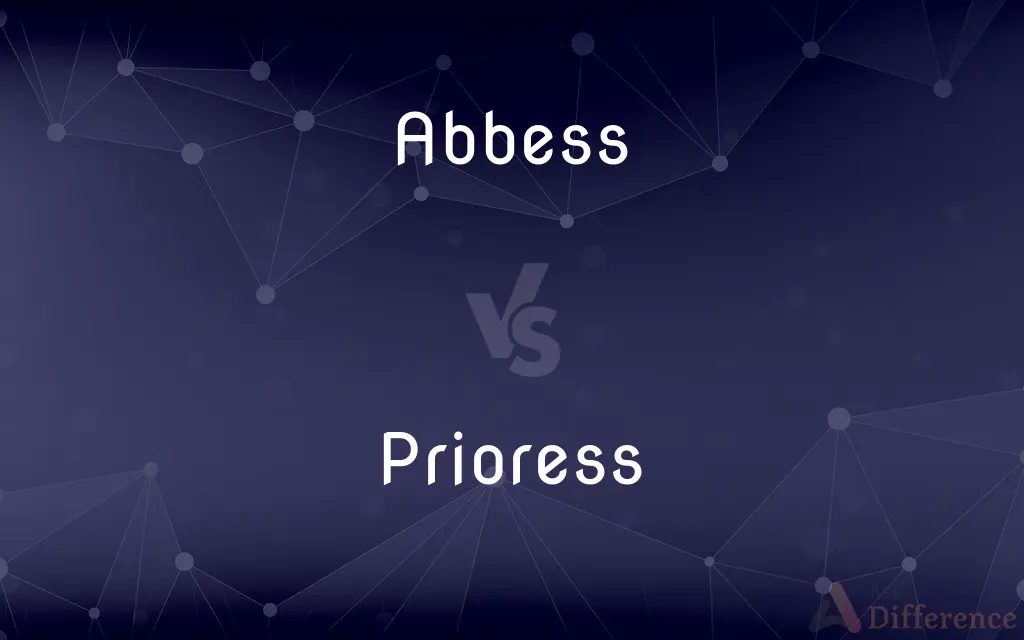Abbess vs. Prioress — What's the Difference?
By Maham Liaqat & Urooj Arif — Updated on April 20, 2024
An abbess is the head of an abbey of nuns, holding considerable autonomy and authority, whereas a prioress serves under an abbess in larger communities or leads smaller ones without the full authority of an abbess.

Difference Between Abbess and Prioress
Table of Contents
ADVERTISEMENT
Key Differences
Abbess typically holds the highest authority in an abbey, responsible for the overall management and spiritual guidance of the community, whereas a prioress often acts as a deputy or assistant in larger nunneries, or leads in the absence of an abbess.
Abbess has significant ecclesiastical authority, including the power to admit new nuns and manage the abbey's affairs, while a prioress generally has more limited administrative duties and less autonomy, especially in decisions affecting the whole community.
Abbess may be elected by the monastic community or appointed by higher ecclesiastical authorities, depending on the order's rules, whereas the selection of a prioress is usually influenced or decided by the abbess herself.
Abbess often interacts directly with external ecclesiastical and civil authorities, representing her community in all external matters, on the other hand, the prioress handles more of the internal day-to-day operations within the abbey.
Abbess holds a position that historically includes significant spiritual, community, and sometimes political influence, whereas the role of a prioress is primarily focused on leadership and management within the community, without the external influence.
ADVERTISEMENT
Comparison Chart
Authority Level
Highest in the abbey
Second or delegated authority in the abbey
Main Responsibilities
Overall management, spiritual leadership
Assisting the abbess, managing daily operations
Autonomy
High autonomy in decisions
Limited autonomy, often guided by the abbess
External Interaction
Represents abbey externally
Primarily internal focus, less external interaction
Election/Appointment
Elected by community or appointed
Usually appointed by the abbess or community
Compare with Definitions
Abbess
The female superior of an abbey of nuns.
The abbess convened the community to discuss the new educational initiatives.
Prioress
A nun ranking just below the abbess.
The prioress organized the daily schedule and ensured all tasks were assigned.
Abbess
A woman who is the head of certain houses of nuns.
The abbess was respected for her wise leadership and deep compassion.
Prioress
A position of leadership, yet under the guidance of an abbess.
Though she was prioress, major decisions were still overseen by the abbess.
Abbess
An ecclesiastical leader with significant religious authority.
The abbess played a crucial role in the regional church conferences.
Prioress
The head of a small abbey or convent.
In her smaller community, the prioress acted with the full authority of an abbess.
Abbess
The senior nun in charge of an abbey.
As abbess, she introduced reforms to improve the abbey’s sustainability practices.
Prioress
Responsible for the internal affairs of the convent.
The prioress was particularly attentive to the needs and welfare of the younger nuns.
Abbess
Holds ultimate responsibility for the decisions of her convent.
The abbess approved the new construction plans for the abbey expansion.
Prioress
The deputy of an abbess in a large monastic community.
As prioress, she handled the internal management while the abbess was abroad.
Abbess
In Catholicism, an abbess (Latin abbatissa, feminine form of abbas, abbot) is the female superior of a community of nuns, which is often an abbey.
Prioress
A nun in charge of a priory or ranking next below the abbess of an abbey.
Abbess
The superior of a convent.
Prioress
A nun in charge of a priory (usually lower in rank than an abbess); mother superior.
Abbess
Used as a title for such a person.
Prioress
A lady superior of a priory of nuns, and next in dignity to an abbess.
Abbess
A female superior or governess of a nunnery, or convent of nuns, having the same authority over the nuns which the abbots have over the monks.
The abbess was always after the nuns to keep the convent immaculately clean.
Prioress
The superior of a group of nuns
Abbess
A woman who runs a brothel; a woman employed by a prostitute to find clients.
Abbess
A female superior or governess of a nunnery, or convent of nuns, having the same authority over the nuns which the abbots have over the monks. See Abbey.
Abbess
The superior of a group of nuns
Common Curiosities
What qualifications are required to become an abbess?
Typically, becoming an abbess requires extensive experience in monastic life, deep spiritual knowledge, and leadership qualities.
How is the leadership effectiveness of an abbess measured?
Leadership effectiveness of an abbess is often measured by the spiritual health and administrative success of the abbey, as well as the personal well-being of its members.
What are the main differences in duties between an abbess and a prioress?
An abbess has overarching responsibilities for the entire abbey, including spiritual leadership and external representation, whereas a prioress focuses more on internal management and daily operations.
What kind of authority does an abbess hold over a prioress?
An abbess holds overarching authority in the abbey, including decision-making power over the prioress, who must adhere to her directives and leadership.
What training is required to become a prioress?
Training to become a prioress usually involves years of monastic living, spiritual education, and administrative experience within the convent to prepare for leadership responsibilities.
Can a prioress become an abbess?
Yes, a prioress can become an abbess if she is elected by her community or appointed by ecclesiastical authorities based on her qualifications and leadership abilities.
Are there any specific rituals involved in becoming an abbess or prioress?
Yes, becoming an abbess or prioress typically involves specific religious rituals, which may include a formal election, a blessing, and an installation ceremony conducted by higher ecclesiastical authorities.
What impact does an abbess have on the community outside the abbey?
An abbess can significantly influence the local community through outreach, educational programs, and spiritual guidance, often becoming a respected figure in local and religious circles.
Is the role of a prioress recognized outside the convent?
While recognized, the role of a prioress is less prominent outside the convent compared to the abbess, who acts as the primary representative.
How does the community select an abbess or prioress?
The selection of an abbess or prioress is typically done through a vote by the members of the convent, though the exact process can vary based on the constitutions of their religious order.
How does a prioress contribute to the spiritual life of the convent?
A prioress contributes to the spiritual life by organizing religious activities, overseeing the training and development of younger nuns, and supporting the abbess in fostering a devout environment.
How long does someone typically serve as an abbess or prioress?
The terms of service for an abbess or prioress can vary widely depending on the rules of their specific religious order, but they are often elected for a set term, which can be renewed.
What is the historical significance of the roles of abbess and prioress?
Historically, abbesses and prioresses have played significant roles in the education and health care of communities, managing substantial landholdings and influencing local and sometimes national affairs.
What challenges does an abbess face in her role?
An abbess faces challenges such as managing the community’s needs, dealing with external pressures, maintaining financial stability, and ensuring adherence to spiritual and administrative responsibilities.
Can a prioress make decisions independently of an abbess?
A prioress generally makes day-to-day operational decisions but must consult with or seek approval from the abbess for major decisions or changes in policy.
Share Your Discovery

Previous Comparison
Petty vs. Spiteful
Next Comparison
Lolita vs. TeaseAuthor Spotlight
Written by
Maham LiaqatCo-written by
Urooj ArifUrooj is a skilled content writer at Ask Difference, known for her exceptional ability to simplify complex topics into engaging and informative content. With a passion for research and a flair for clear, concise writing, she consistently delivers articles that resonate with our diverse audience.
















































